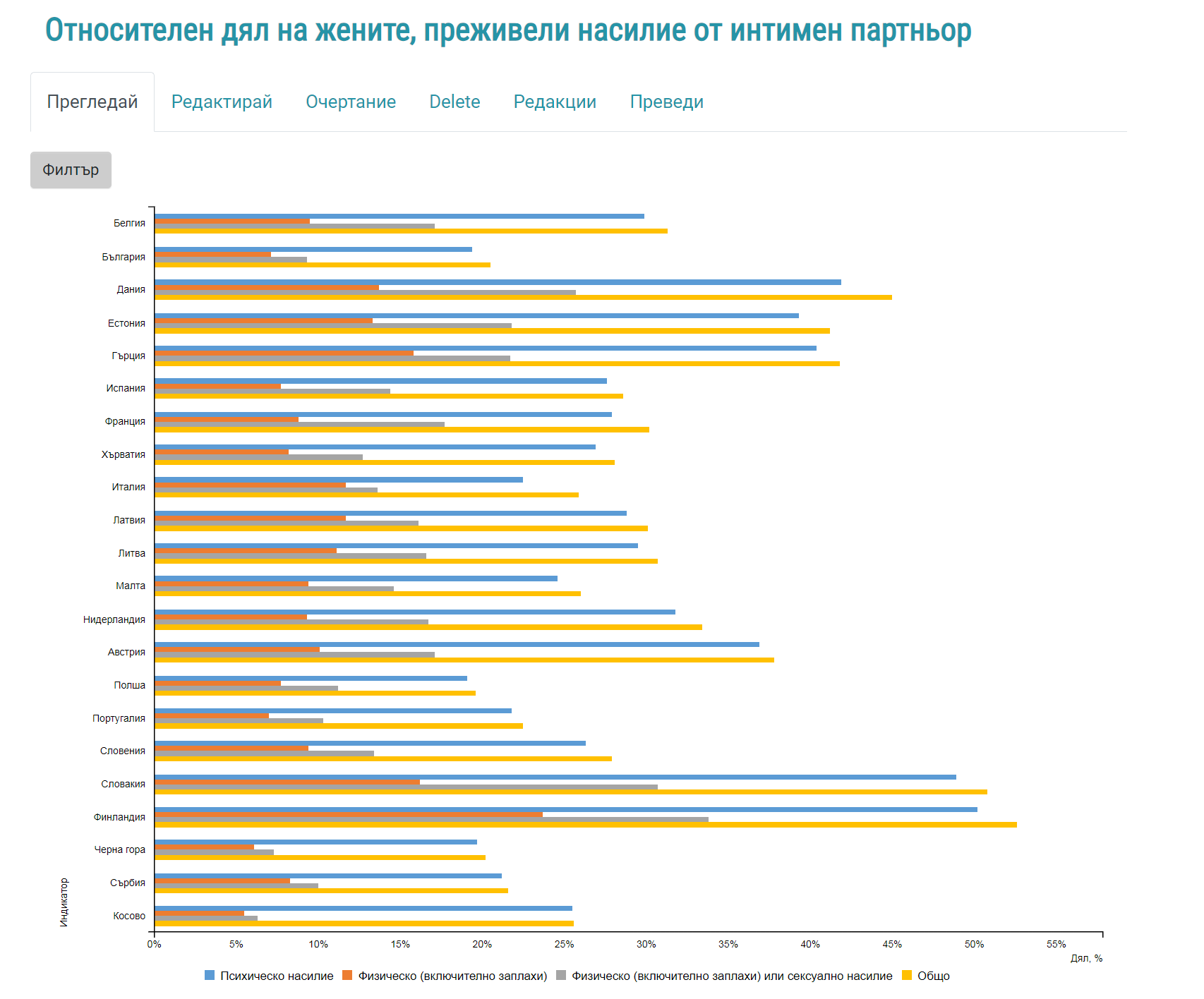Gender-based violence and sexual violence as its expression is a human rights violation and a very serious threat to public health.
According to the World Health Organisation globally every third woman has been a victim of such violence at least once in her life and in most of the cases that was violence by the intimate partner.
The definition of violence by an intimate partner (current or former) used by international organisations behaviour that causes physical, sexual or psychological damage including aggression, sexual coercion, psychological harassment and controlling behaviour.
The UN studies disclose that a significant part of this type of violence is not reported or officially registered. Therefore, the researchers combine police statistics with surveys. The results show that only a third of the victims of violence by a partner and a quarter of the victims of violence by a person other than a partner report to the police or turn to an organisation for support and those are the most serious cases.
In the European survey held by Eurostat to measure gender-based violence following the definition included in the Istanbul Convention the number of women who declared they have experienced sexual violence in the past 5 years is much higher than the number of sexual violence reports to the police. The 2021 wave that covers 5 states (Bulgaria is one of them) states that the number of reports of violence registered by the police is less than 5% of the total number of women who said they have experienced violence in the survey. It the survey methodology Eurostat warns that the data should be read as an approximation of the real prevalence of this phenomenon because they depend on the respondents’ willingness to share their experience.
The data show the following:
For indicator “Psychological violence” (figure Relative share of women who have experienced violence by an intimate partner, blue line) Bulgaria has the lowest share among the countries of the European Economic Area България (and the United Kingdom).
For indicator “Physical violence” (figure Relative share of women who have experienced violence by an intimate partner,orange line) Bulgaria has the lowest share among the countries of the European Economic Area България (and the United Kingdom together with Portugal.
For indicator “Physical and sexual violence” (figure Relative share of women who have experienced violence by an intimate partner,grey line) Bulgaria has the lowest share among the countries of the European Economic Area Bulgaria (and the United Kingdom).
All data of this graph refer to violence on the part of an intimate partner.

The other graph shows the results for violence by any perpetrator.

The first thing that becomes evident when we compare the graphs is the much higher frequency of violence by an intimate partner than by any perpetrator.
The key conclusion however is that in comparative perspective the problem of gender-based violence seems to be the smallest in Bulgaria from among all the European countries. Is that possible?
In January 2024 a conference dedicated to combat with domestic violence was held in Sofia where the Ministry of Interior announced that more than 20 women were killed by men during the previous year in Bulgaria and the registered cases of domestic violence were close to 1400. A serious increase was also registered in the domestic violence reports – 1359 only in January versus 749 in the previous year. “81,4% increase in the cases of domestic aggression is something extremely worrying”, MoI’s secretary general commented.
The police statistics suggests that the likelihood of the relative share of gender-based violence in Bulgaria being the lowest in the whole of Europe is low. Which in turn suggests that the values are underestimated. The reason for this is not in Eurostat but in the attitudes, behaviour and perceptions of the respondents.
To check the credibility of this conclusion we examine the factors leading to men’s aggressive behaviour to women.
The World Health Organisation classifies the factors related to gender-based violence into personality, family, community and societal problems.
The personality factors of aggressive behaviour are low level of education, experienced harassment and sexual violence during childhood, excessive alcohol consumption, substance abuse, emotional instability, personality antisocial disorder.
The family factors of aggressive behaviour are violence in the family, lack of infirmity and dissatisfaction with the marriage, difficult communication between the partners.
The community factors of aggressive behaviour are community norms that privilege or grant higher status to men; community norms that make violence against women acceptable; absence of true equality between the sexes.
With the application of a statistical method, we check whether any dependence (correlation) exists between the data on violence accounting of the three covered indicators and available data from the personality spectrum. The available data, again from Eurostat, are excessive use of alcohol, substance abuse, personality disorders (depression) and low level of education,
The calculations show lack of correlation (dependence) between violence and personality factors. We must make the point here that these data should also be read as an approximation since their collection is based on voluntary reports. In this situation the calculations for correlation cannot be controlled for any indicator. Thus, the prevalence of violence by an intimate partner is not dependent on personality factors.
One possible conclusion in this condition of the available information is that the influence of the public norms dominates, namely tolerance towards violence and the level of its normalisation inside the family. The results we get for Bulgaria support the conclusions of a number of international organisations and research institutions, the Council of Europe etc. who assert that sexist attitudes in a society legitimize gender-based violence. They are maintained by stereotypes and prejudice, the masculinity and femininity norms, the concept of the family space as controlled by the man and the general perception of violence as an acceptable way of solving conflicts and self-assertion.
The unflattering conclusion from the illustrated surveys is that the public environment in Bulgaria not simply reproduces the ugly phenomenon of gender-based violence but also distorts the statistics.
